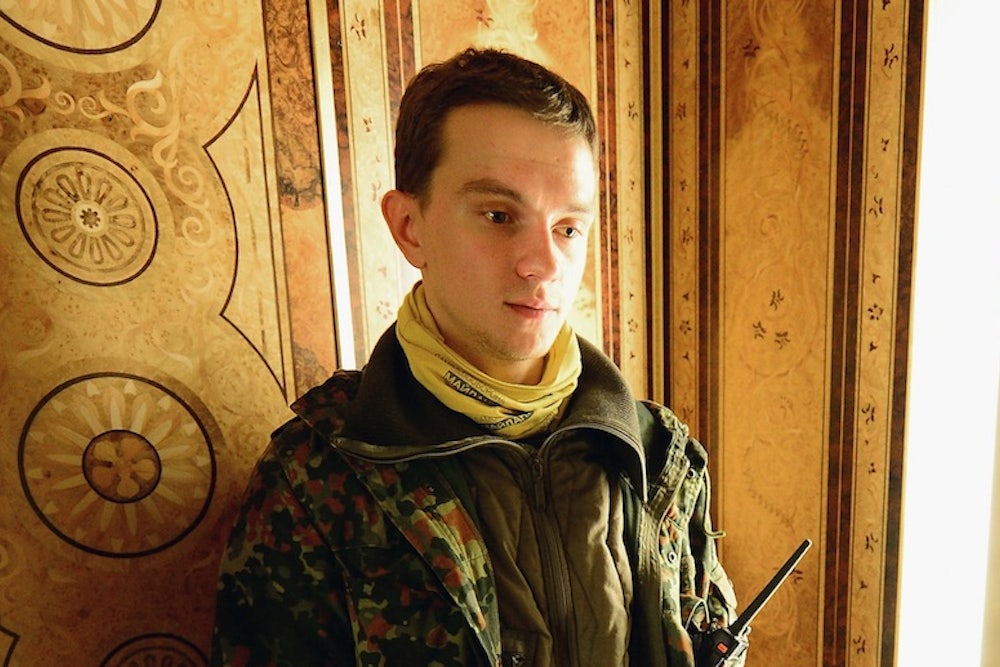Mezhyhirya, the opulent estate of former Ukrainian President Viktor Yanukovych, has always resembled a theme park—and now it's turning into one. Visitors looking to ogle the ousted leader’s private zoo or step aboard his scale-model Spanish galleon are now welcome to tour the 350-acre grounds for a small fee. On a rainy day this week, children on a school trip ran between the property’s many fountains, speeding past visitors peering into the windows of the wooden mansion. The estate represents everything that was wrong with Yanukovych’s presidency—the rampant corruption, greed, and ambivalence toward the people. It’s where Yanukovych and his security chiefs planned attacks on Ukrainian journalists and geared up for the brutal crackdown on Maidan protesters.
Just outside the gates to the property, the disastrous impact of Yanukovych’s administration is visible in quite a different way. Dozens of security, housekeeping, and maintenance personnel used to live in dormitories adjacent to the mansion. Now that Yanukovych is gone, so are many of his staffers—but the dormitories are not empty. For months, refugees from Crimea, eastern Ukraine, and even a few from Russia have been occupying the premises. Families share spare, barely furnished single-bedroom units, and bags of clothes and toys are piled up in common spaces. They are all awaiting the same thing: government assistance and official status as refugees.

Inna Pomerleau, an architect from Simferopol, has been living at Mezhyhirya with her six-year-old daughter, Oksana, for ten days. Pomerleau refused to assume Russian citizenship in April, when all residents of Crimea were forced to choose between Russia and Ukraine. After that, she says, it became extremely difficult to be in Simferopol, where she had lived for her whole life. “Life in Crimea is very complicated. Right now, it’s impossible to have a job there,” she said. Taxis wouldn’t come to her house, her Ukrainian insurance was no longer valid, and her daughter’s Ukrainian-language school was shut down under the new Russian rule. Her mother and father took Russian citizenship and remain in Crimea, where they will receive the enhanced pensions that Russia promised some Crimeans. “Old people stay in Crimea, young people leave,” says Pomerleau. “Nobody wants a Russian diploma.” She hopes to eventually move to the United States and get her daughter back in school. “I can’t take a Russian passport right now, and I don’t want one,” she says.
The UN has said that about 10,000 Ukrainians—mostly Crimeans—have been displaced internally. Correspondents covering the fighting in the east estimate that some 40 percent of civilians in Donetsk, Luhansk, and Slovyansk have left their homes. And while the Ukrainian government has established a program for helping Crimean refugees, no support is yet available for those who have fled from the east. As Maxim Eristavi writes, those displaced from the east are in the complicated position of being refugees in their own country. For now, many refugees must rely on help from self-defense forces on Kiev’s Maidan Square; those who I spoke to at Mezhyhirya had spent several days on the Maidan, where volunteers helped secure housing for them. On Thursday, as I toured one of the buildings where refugees were living, a playground was being installed outside. When I asked a resident if she knew who was paying for the structure, she mentioned that the nationalist group Right Sector had helped her family out.

Meanwhile, on Thursday, Russian Prime Minister Dmitry Medvedev claimed that 4,000 Ukrainians have sought asylum in Russia. "The Ukrainian authorities are refusing to see any humanitarian problems. They are even speaking about the absence of refugees. It is a lie," Medvedev said. But that number is almost certainly an exaggeration, and the facts seem to indicate that more people are trying to leave Russia than enter it. As Masha Gessen wrote in The New York Times last month, all the talk in Moscow is about emigration to the United States, Europe, or Israel.
But some Russian refugees are also moving to Ukraine. Evgeny Ananyev, a 30-year-old from outside Krasnodar, Russia, arrived at Mezhyhirya with his wife and 10-year-old son two weeks ago. In his hometown, “Life was bad,“ he says. “The MVD [Russia’s Ministry of Internal Affairs], FSB [Federal Security Service] and others—the only thing they are doing is forcing people to be quiet and still." He had been the main witness of a murder case in Krasnodar in which a policeman killed one of his neighbors, Ananyev says. “The policeman came to my house and tried to talk me out of becoming the main and only witness at court. And after a month, nine men with dogs came and turned everything upside down in my home. They turned off the water supply to my house…I had to carry water home from 100 meters away.”
As a Russian citizen seeking asylum in Ukraine, Ananyev is in an especially difficult situation. But nevertheless, he is glad to have found a tenuous asylum on Ukrainian territory; his two main hopes are that President Obama will impose a third round of sanctions against Russia, and that Ukraine will grant him refugee status. Leaning on the entranceway to the dormitory he was staying in, he smiled as he showed me a photo on his cell phone. It was of recent TIME magazine cover featuring Putin's stern glare that reads: "Premier, President, Czar." The issue had come out just as Ananyev and his family were preparing to settle into Mezhyhirya. One czar had driven them out of Russia, and they found shelter in the abandoned home of another.
